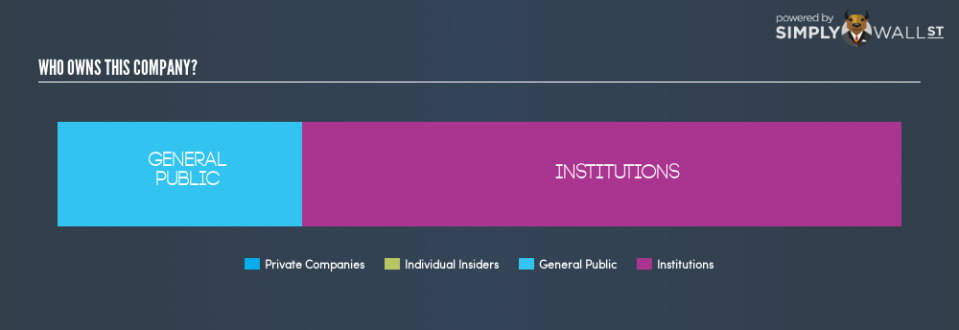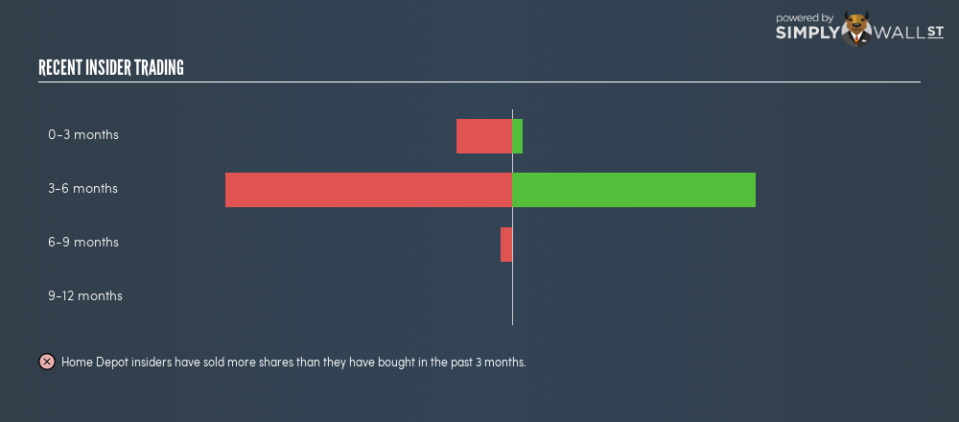The The Home Depot Inc (NYSE:HD) Ownership Structure Could Be Important

In this article, I’m going to take a look at The Home Depot Inc’s (NYSE:HD) latest ownership structure, a non-fundamental factor which is important, but remains a less discussed subject among investors. Ownership structure has been found to have an impact on shareholder returns in both short- and long-term. The effect of an active institutional investor with a similar ownership as a passive pension-fund can be vastly different on a company’s corporate governance and accountability to shareholders. While this may be more interesting for long-term investors, short-term investors can also benefit by paying attention to when these institutions trade in order to take advantage of the heightened volatility. Therefore, it is beneficial for us to examine HD’s ownership structure in more detail.
Check out our latest analysis for Home Depot
Institutional Ownership
HD’s 70.9% institutional ownership seems enough to cause large share price movements in the case of significant share sell-off or acquisitions by institutions, particularly when there is a low level of public shares available on the market to trade. Although HD has a high institutional ownership, such stock moves, in the short-term, are more commonly linked to a particular type of active institutional investors – hedge funds. For HD shareholders, the potential of this type of share price volatility shouldn’t be as concerning as hedge fund ownership is is not significant,indicating few chances of such sudden price moves. While that hardly seems concerning, I will explore further into HD’s ownership type to find out how it can affect the company’s investment profile.
Insider Ownership
Insiders form a group of important ownership types as they manage the company’s operations and decide the best use of capital. Insider ownership has been linked to better alignment between management and shareholders. Although individuals in HD hold only a minor stake, given HD is a large-cap company, it is relatively meaningful. This is a good sign for shareholders as the company’s executives and directors have their incentives directly linked to the company’s performance. It would also be interesting to check what insiders have been doing with their shareholding recently. Insider buying can be a positive indicator of future performance, but a selling decision can be simply driven by personal financial requirements.
General Public Ownership
A big stake of 29.0% in HD is held by the general public. This size of ownership gives retail investors collective power in deciding on major policy decisions such as executive compensation, appointment of directors and acquisitions of businesses.
Private Company Ownership
Another group of owners that a potential investor in HD should consider are private companies, with a stake of 0.001%. While they invest more often due to strategic interests, an investment can also be driven by capital gains through share price appreciation. However, an ownership of this size may be relatively insignificant, meaning that these shareholders may not have the potential to influence HD’s business strategy. Thus, investors not need worry too much about the consequences of these holdings.
Next Steps:
HD’s considerably high level of institutional ownership calls for further analysis into its margin of safety. This is to avoid getting trapped in a sustained sell-off that is often observed in stocks with this level of institutional participation. However, if you are building an investment case for HD, ownership structure alone should not dictate your decision to buy or sell the stock. Rather, you should be looking at fundamental drivers such as the intrinsic valuation, which is a key driver of Home Depot’s share price. I urge you to complete your research by taking a look at the following:
Future Outlook: What are well-informed industry analysts predicting for HD’s future growth? Take a look at our free research report of analyst consensus for HD’s outlook.
Past Track Record: Has HD been consistently performing well irrespective of the ups and downs in the market? Go into more detail in the past performance analysis and take a look at the free visual representations of HD’s historicals for more clarity.
Other High-Performing Stocks: Are there other stocks that provide better prospects with proven track records? Explore our free list of these great stocks here.
NB: Figures in this article are calculated using data from the last twelve months, which refer to the 12-month period ending on the last date of the month the financial statement is dated. This may not be consistent with full year annual report figures.
To help readers see past the short term volatility of the financial market, we aim to bring you a long-term focused research analysis purely driven by fundamental data. Note that our analysis does not factor in the latest price-sensitive company announcements.
The author is an independent contributor and at the time of publication had no position in the stocks mentioned. For errors that warrant correction please contact the editor at editorial-team@simplywallst.com.

 Yahoo Finance
Yahoo Finance 

